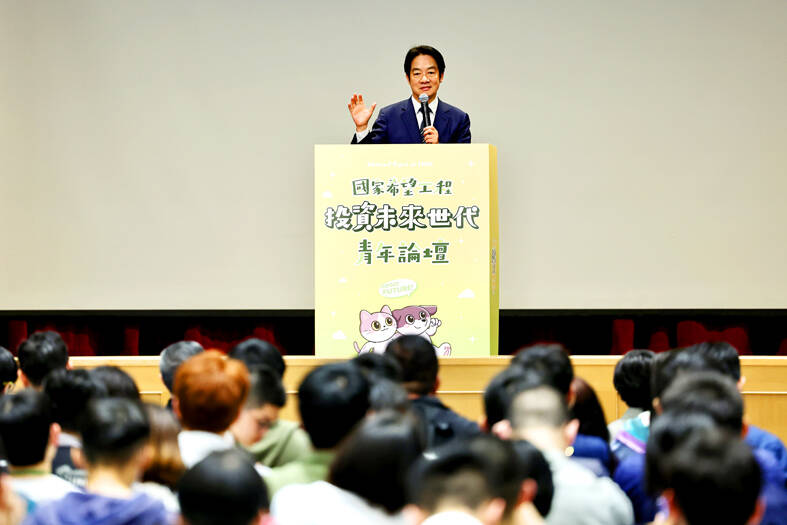President-elect William Lai’s (賴清德) plan to deepen ties with Southeast Asian countries after taking office might be challenging due to China’s growing influence in the region, the Nikkei Asia said on Saturday.
Lai is poised to build on President Tsai Ing-wen’s (蔡英文) legacy and continue to foster deeper engagement with Southeast Asia after his inauguration on May 20, the Nikkei Asia reported.
“The new government will continue the good foundation and results of the New Southbound Policy and continue to deepen relations with Southeast Asian and South Asian countries,” Ministry of Foreign Affairs spokesman Jeff Liu (劉永健) was quoted by the Nikkei Asia as saying.

Photo: CNA
Deepening relations with Southeast Asian and Indo-Pacific countries has been a long-term objective of the Ministry of Foreign Affairs, he said.
Tsai launched the New Southbound Policy in 2016 to strengthen Taiwan’s relations with 18 nations — Australia, Bangladesh, Bhutan, Brunei, Cambodia, India, Indonesia, Laos, Malaysia, Myanmar, Nepal, New Zealand, Pakistan, Philippines, Singapore, Sri Lanka, Thailand and Vietnam — through economic and trade collaboration, talent exchanges, resource sharing and regional connectivity, the Executive Yuan said.
None of the 18 nations has formal diplomatic ties with Taiwan.
Taipei last year approved US$5.54 billion of investments under the New Southbound Policy, exceeding that in China for the second consecutive year, the Executive Yuan’s Office of Trade Negotiations said.
Minister of Economic Affairs Wang Mei-hua (王美花) was quoted by the Nikkei Asia as saying that “the trend will only continue because of the push from the US-China trade tensions.”
Chong Ja Ian (莊嘉穎), a political science professor at National University of Singapore and a nonresident scholar at Carnegie China, said that the engagement “remains largely focused on commercial interaction.”
However, Southeast Asian countries’ “reluctance to antagonize China by being seen to be close to Taipei” has proved an obstacle to the nation’s effort to deepen ties with them, the paper said.
The governments as well as societal and commercial actors are “cautious about demonstrating interest in Taiwan,” Chong said.
Taiwan has been striving to bolster people-to-people exchanges with Southeast Asian nations by relaxing visa rules and offering more university scholarships, the paper said.
Whether to continue attracting students or recruiting talent to work in Taiwan from these countries would be challenging for the new president as “Chinese influence is on the rise in Southeast Asia,” it said.
Polling conducted by the ISEAS-Yusof Ishak Institute as part of its State of Southeast Asia 2024 Survey showed that more than half of respondents, 50.5 percent, from Southeast Asian nations favored China over the US.
The survey also found a growing sense of optimism among Southeast Asian respondents regarding their nation’s future relations with China, with 51.4 percent anticipating improvement, up from 38.7 percent the previous year.

The Executive Yuan yesterday announced that registration for a one-time universal NT$10,000 cash handout to help people in Taiwan survive US tariffs and inflation would start on Nov. 5, with payouts available as early as Nov. 12. Who is eligible for the handout? Registered Taiwanese nationals are eligible, including those born in Taiwan before April 30 next year with a birth certificate. Non-registered nationals with residence permits, foreign permanent residents and foreign spouses of Taiwanese citizens with residence permits also qualify for the handouts. For people who meet the eligibility requirements, but passed away between yesterday and April 30 next year, surviving family members

The German city of Hamburg on Oct. 14 named a bridge “Kaohsiung-Brucke” after the Taiwanese city of Kaohsiung. The footbridge, formerly known as F566, is to the east of the Speicherstadt, the world’s largest warehouse district, and connects the Dar-es-Salaam-Platz to the Brooktorpromenade near the Port of Hamburg on the Elbe River. Timo Fischer, a Free Democratic Party member of the Hamburg-Mitte District Assembly, in May last year proposed the name change with support from members of the Social Democratic Party and the Christian Democratic Union. Kaohsiung and Hamburg in 1999 inked a sister city agreement, but despite more than a quarter-century of

Taiwanese officials are courting podcasters and influencers aligned with US President Donald Trump as they grow more worried the US leader could undermine Taiwanese interests in talks with China, people familiar with the matter said. Trump has said Taiwan would likely be on the agenda when he is expected to meet Chinese President Xi Jinping (習近平) next week in a bid to resolve persistent trade tensions. China has asked the White House to officially declare it “opposes” Taiwanese independence, Bloomberg reported last month, a concession that would mark a major diplomatic win for Beijing. President William Lai (賴清德) and his top officials

‘ONE CHINA’: A statement that Berlin decides its own China policy did not seem to sit well with Beijing, which offered only one meeting with the German official German Minister for Foreign Affairs Johann Wadephul’s trip to China has been canceled, a spokesperson for his ministry said yesterday, amid rising tensions between the two nations, including over Taiwan. Wadephul had planned to address Chinese curbs on rare earths during his visit, but his comments about Berlin deciding on the “design” of its “one China” policy ahead of the trip appear to have rankled China. Asked about Wadephul’s comments, Chinese Ministry of Foreign Affairs spokesman Guo Jiakun (郭嘉昆) said the “one China principle” has “no room for any self-definition.” In the interview published on Thursday, Wadephul said he would urge China to